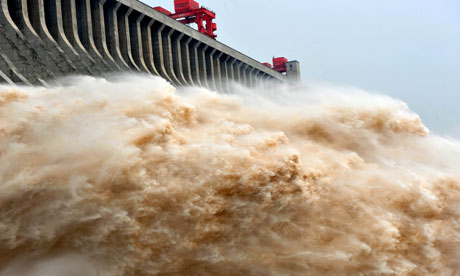China has acknowledged that its showcase Three Gorges Dam, the world's largest hydroelectric project, has caused a slew of urgent environmental, geologic and economic problems.
The state council, or cabinet, made the rare admission late on Wednesday that the $23bn (£14bn) project was successful but requires action to curb pollution, counter risks of natural disasters and improve the living standards of the 1.4 million people who were forced to relocate.
"While the Three Gorges project has brought great and comprehensive benefits, there are problems that must be urgently resolved in the resettlement and wealth-making of immigrants, environmental protection and geological disaster prevention," it said.
The statement outlines plans for a cleaner, safer and more sustainable future for the Three Gorges region, a scenic section of the Yangtze River that was dammed to create a 410-mile-long reservoir.

It said public services and conditions need to be improved for the people moved to make way for the project.
"We must always put people first to ensure people's livelihood, environmental protection and balanced, sustainable development," it said.
"We must strengthen ecological protection and control pollution in the reservoir area ... and the prevention and control of geological disasters."
The Three Gorges Dam, touted as the best way to end centuries of flooding along the Yangtze and provide power for China's industrial boom, has been controversial since it was first conceived decades ago.
Some geologists have warned that damming up too much water in the reservoir carries a heightened risk of landslides, earthquakes and prolonged damage to the river's ecology.
The government has acknowledged that filling the reservoir has increased the frequency of earthquakes, but denied that it had anything to do with a powerful quake to the northwest in Sichuan on 12 May 2008, that killed 87,000 people.
Pressure on the Yangtze as a source of water for industry, homes, farming, energy and shipping has mounted amid one of the region's worst droughts in decades.
"As to the irrigation and water supply issues, demand for water has increased rapidly along the middle reaches downstream," the China Daily cited Wang Jingquan, an official with the Yangtze River Water Resource Committee, as saying.
"Water pollution in these areas has made the situation worse," he added.
A detailed report published last year by the Ministry of Environmental Protection found widespread contamination of Yangtze tributaries and lakes with copper, zinc, lead and ammonium. New water treatment plants in Chongqing, the biggest city upriver from the dam, have helped but not eliminated the problem, the ministry said.
Hundreds of millions of people and much of China's industry and inland shipping depend on the Yangtze, China's biggest watershed. But drinking water is scarce, crops are withering and the low flows along many rivers have affected hydroelectric plants, compounding widespread power shortages.
Shipping is stalled at some points downstream from the dam, and water authorities in the middle reaches of the river said they began extra dredging work this week to prevent the problem from worsening.
Communities downstream from the Three Gorges have begun diverting flows from the Yangtze to restore parched water supplies in central China's Hunan and Hubei provinces, the official Xinhua News Agency reported Thursday, citing water officials in Hunan's Huarong county.
The Three Gorges Power Co, operator of the massive dam, has been discharging extra amounts of water to help fight the drought.

